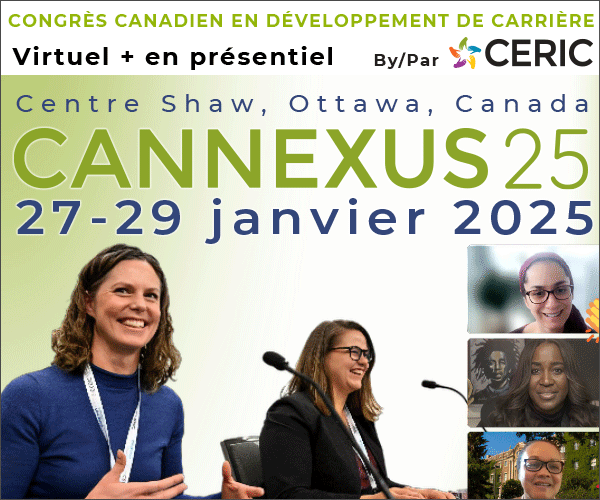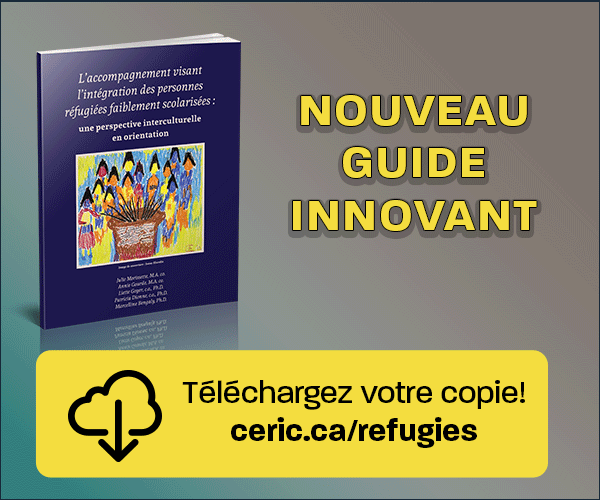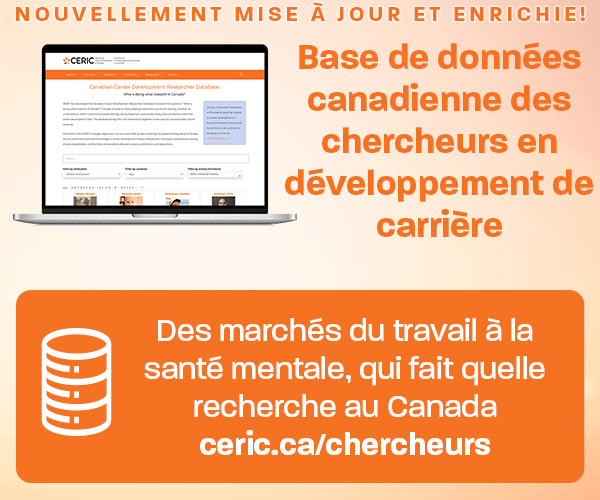Le mentorat comme méthode d’orientation professionnelle : évaluation d’un programme de mentorat par les pairs chez les étudiants en psychologie des universités canadiennes
Mots-clés :
mentoring, peer-mentorship, career intervention, higher education, psychologyRésumé
This study evaluated the effectiveness of the Canadian Psychological Association (CPA) Student Mentorship Program, a formal peer-mentoring program for undergraduate students (mentees) and graduate students (mentors) studying psychology in Canada. Previous researchers have not sufficiently examined the effectiveness of formal peer-mentoring programs, particularly within the psychology discipline in higher education settings. The purpose of this investigation was to explore the program’s effectiveness as a career intervention, including its acceptability, feasibility, outcomes, strengths, and limitations. One hundred and seventy-eight students participated in the program and data was collected at three time points (at baseline, three and six months). Descriptive and inferential statistics were obtained, in addition to minimally inductive content analyses for open-ended items. Results indicated that most mentors (63%) and mentees (58%) experienced the program as effective to highly effective, with 100% of participants supporting of the continuation of the program. Overall, 86% of mentors and 63% of mentees reported that participation in the program was moderately to strongly related to the achievement of their career goals. Program strengths and limitations were identified which reinforce aspects of the program that have served participants well, in addition to areas which should be improved for future iterations of the peer-mentoring program.
Références
Allen, T. D. (2007). Mentoring relationships from the perspective of the mentor. The handbook of mentoring at work: Theory, research, and practice. Thousand Oaks, CA: Sage.
Allen, T. D., Eby, L. T., O’Brien, K. E., & Lentz, E. (2008). The state of mentoring research: A qualitative review of current research methods and future research implications. Journal of Vocational Behavior, 73(3), 343-357. doi: 10.1016/j.jvb.2007.08.004
American Psychological Association. (2014). Commission on Accreditation 2014 Annual Report Online Summary Data: Doctoral Programs. Washington, DC. Retrieved from: https://www.apa.org/ed/accreditation/about/research/2014-internship-summary.pdf. Accessed on 08.29. 16.
Canadian Psychological Association. (2016). http://www.cpa.ca/aboutcpa/cpasections/. Accessed 12. 22. 2016
Carden, A. D. (1990) Mentoring and adult career development: The evolution of a theory. The Counseling Psychologist, 18(2), 275-99.
Castro, S. L., & Scandura, T. A. (2004, November). The tale of two measures: Evaluation and comparison of Scandura’s (1992) and Ragins and McFarlin’s (1990) mentoring measures. Paper presented at the Southern ManagementAssociation Meeting, San Antonio, TX.
Chen, G., Gully, S. M., & Eden, D. (2001). Validation of a new general self-efficacy scale. Organizational Research Methods, 4, 62-83. doi:10.1177/109442810141004
Colvin, J. W., & Ashman, M. (2010). Roles, risks, and benefits of peer mentoring relationships in higher education. Mentoring & Tutoring: Partnership in Learning,18 (2), 121-134. doi:10.1080/13611261003678879
Crisp, G., & Cruz, I. (2009). Mentoring college students: A critical review of the literature between 1990 and 2007. Research in Higher Education, 50(6), 525-545.doi: 10.1007/s11162-009-9130-2
Eby, L. T., Durley, J., Evans, S. C., & Shockley, K. (2005, April). What predicts the benefits of mentoring for mentors? Paper presented at the 20th Annual Conference of the Society for Industrial and Organizational Psychology, Los Angeles, CA.
Eby, L. T., & Lockwood, A. (2005). Protégés’ and mentors’ reactions to participating in formal mentoring programs: A qualitative investigation. Journal of Vocational Behavior, 67, 441–458. doi: 10.1016/j.jvb.2004.08.002
Ehrich, L. C., Hansford, B. C., & Tennent, L. (2003, September). Mentoring in medical contexts. Paper presented at British Education Research Association Conference, Edinburgh, United Kingdom.
Ensher, E. A., Thomas, C., & Murphy, S. E. (2001). Comparison of traditional, step-ahead, and peer mentoring on protégés' support, satisfaction, and perceptions of career success: A social exchange perspective. Journal of Business and Psychology, 15(3), 419-438. doi:10.1023/A:1007870600459
Foster, S. & MacLeod, J. (2015). The role of mentoring relationships in the career development of successful deaf persons. Journal of Deaf Studies and Deaf Education, 9 (4). 442-458. doi: 10.1093/deafed/enh053
Ghosh, R., & Reio, T. G. (2013). Career benefits associated with mentoring for mentors: A meta-analysis. Journal of Vocational Behavior, 83(1), 106-116. doi: 10.1016/j.jvb.2013.03.011
Hu, C. (2008). Analyses of measurement equivalence across gender in the Mentoring Functions Questionnaire (MFQ-9). Personality and Individual Differences, 45(3), 199-205. doi: 10.1016/j.paid.2008.03.016
Jacobi, M. (1991). Mentoring and undergraduate academic success: A literature review. Review of Educational Research, 61(4), 505–532. doi: 10.3102/00346543061004505.
Kao, K. Y., Rogers, A., Spitzmueller, C., Lin, M. T., & Lin, C. H. (2014). Who should serve as my mentor? The effects of mentor's gender and supervisory status on resilience in mentoring relationships. Journal of Vocational Behavior, 85(2), 191-203. doi: 10.1016/j.jvb.2014.07.004
Kanter, R. (1977). Men and women of the incorporation. New York, NY: Basic Books.
Keller, T.E. (2005). The stages and development of mentoring relationships. In D.L. DuBois & M. Karcher (Eds.), The handbook of youth mentoring (pp. 82–99). Thousand Oaks, CA: Sage.
Kram, K. (1983) Phases of the mentor relationship. Academy of Management Journal, 26, 608–625. doi: 10.2307/255910
Kram, K. & Isabella, L. (1985). Mentoring alternatives: The role of peer relationships in career development. Academy of Management Journal, 28, 110–132. doi:10.2307/256064
Lankau, M. J., & Scandura, T. A. (2002). An investigation of personal learning in mentoring relationships: Content, antecedents and consequences. Academy of Management Journal, 45, 779-791. doi:10.2307/3069311
Leidenfrost, B., Strassnig, B., Schabmann, A., Spiel, C., & Carbon, C. C. (2011). Peer mentoring styles and their contribution to academic success among mentees: A person-oriented study in higher education. Mentoring & Tutoring: Partnershipin Learning, 19(3), 347- 364. doi: 10.1080/13611267.2011.597122
Lent, R. W., Brown, S. D., & Hackett, G. (2002). Social cognitive career theory. In D. Brown (Eds.), Career choice and development (pp. 255-311). San Francisco, CA: John Wiley & Sons, Inc.
Lent, R. W., Brown, S. D., & Hackett, G. (1994). Toward a unifying social cognitive theory of career and academic interest, choice, and performance [Monograph]. Journal of Vocational Behavior, 45, 79-122.
Levinson, D. J., Darrow, C., Klein, E., Levinson, M. H., & McKee, B. (1978). The seasons of a man's life. New York: Ballantine Books.
Mandich, A., Milller, L., & Law, M. (2002). Outcomes in evidence- based practice. In M. Law (Ed.), Evidence-based rehabilitation: A guide to practice (pp. 49-69). Thorofare, NJ: Slack.
Milner, T., & Bossers, A. (2005). Evaluation of an occupational therapy mentorship program. Canadian Journal of Occupational Therapy, 72(4), 205-211. Retrieved from: http://search.proquest.com.ezproxy.library.ubc.ca/docview/212952687?pq-origsite=360link&accountid=14656
Mitchell, M. E., Eby, L. T., & Ragins, B. R. (2015). My mentor, my self: Antecedents and outcomes of perceived similarity in mentoring relationships. Journal of Vocational Behavior, 89, 1-9. doi: 10.1016/j.jvb.2015.04.008
Pellegrini, E. K., & Scandura, T. A. (2005). Construct equivalence across groups: An unexplored issue in mentoring research. Educational and Psychological Measurement, 65(2), 323-335. doi: 10.1177/0013164404268665
Rogers, C. (1961). A therapist’s view of psychotherapy: On becoming a person. London, Constable.
Scandura, T. A. (1992). Mentorship and career mobility: An empirical investigation. Journal of Organizational Behavior, 13, 169–174. doi: 10.1002/job.4030130206
Strayhorn, T. L., & Terrell, M. C. (2007). Mentoring and satisfaction with college for black students. The Negro Educational Review, 58(1– 2), 69–83. Retrieved from: http://web.b.ebscohost.com.ezproxy.library.ubc.ca/ehost/pdfviewer/pdfviewer?vid=1&sid=2ffeff71-4d9b-4295-9c02-00ce8f46da7c%40sessionmgr1.
Terrion, J. L., & Leonard, D. (2007). A taxonomy of the characteristics of student peer mentors in higher education: Findings from a literature review. Mentoring & Tutoring: Partnership in Learning, 15(2), 149–164. doi:10.1080/13611260601086311
Vance, C. N., & Olson, R. K. (1998). The mentor connection in nursing. New York: Springer Publishing.
Wanberg, C. R., Welsh, E. T., & Hezlett, S. A. (2003). Mentoring research: A review and dynamic process model. Research in Personnel and Human Resources Management, 22, 39-124. http://dx.doi.org/10.1016/S0742-7301(03)22002-1080/13611267.2011.597122

Téléchargements
Publié-e
Comment citer
Numéro
Rubrique
Licence
(c) Tous droits réservés La Revue canadienne de développement de carrière 2020

Cette œuvre est sous licence Creative Commons Attribution - Pas d'Utilisation Commerciale - Pas de Modification 4.0 International.












